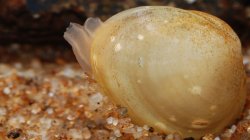
University Calendar
Do Indirect Predator Cues Affect Behavior of the Freshwater Clam Spherium simile?

Jesse Bruce Eichler will present his defense for his MS in Biology.
Abstract
Freshwater bivalves provide important ecosystem services, like filtering water and cycling nutrients. Predators affecting the behavior of bivalve prey, therefore, could potentially impact the structure and function of ecological communities. Because little is known about the antipredator responses of sphaeriid clams, I examined the behavior of juvenile and adult freshwater clams, Sphaerium simile, when exposed to two types of indirect predator cues: effluent of a crayfish (Orconectes rusticus) and damaged conspecific clams. Adult clams responded to crayfish effluent by significantly reducing burrowing behavior. Juvenile clams, however, buried indiscriminately regardless of experimental treatment and significantly more often/more quickly than adults. These results suggest that invasive crayfish predators could cause reduction in adult S. simile activity that in turn might affect community and ecosystem function.
- Dr. Paul Bologna
- Dr. Matthew Aardema
- Dr. Scott Kight (Thesis Sponsor)